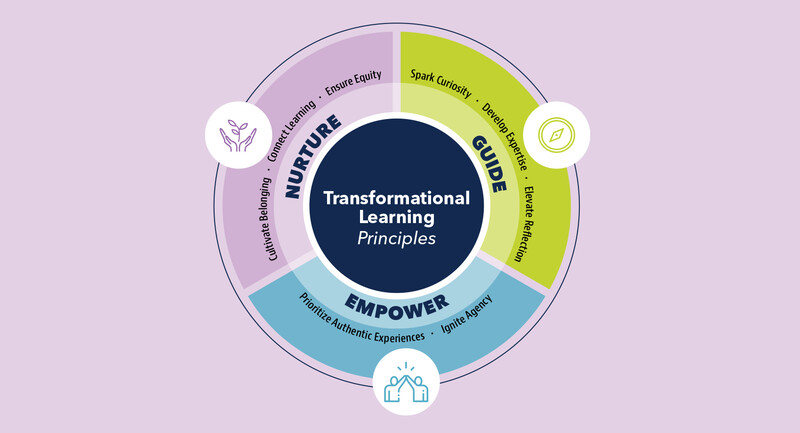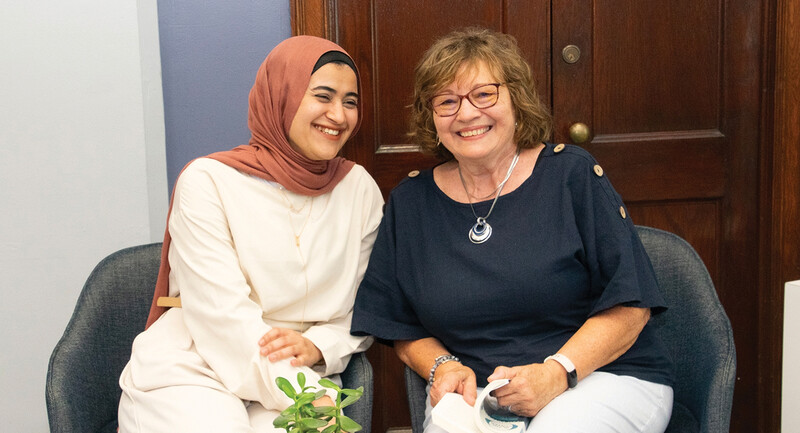Targeted training for principal coaches can be a difference-maker in school leadership development.
When Teresa Campbell became a principal coach in 2013, she certainly knew all that was involved in running a school. After all, she had spent the previous six years as a principal herself, following more than a decade as an elementary school teacher, reading coach, and assistant principal. What Campbell didn't know was how to support someone else in leading a school.
To prepare her to coach school leaders, Campbell's district, Hillsborough County Public Schools in Florida, arranged training with the New Teacher Center, a national nonprofit group that helps districts set up coaching and induction programs. In the workshop, Campbell and the district's other new principal coaches practiced role-playing, questioning techniques, and other coaching strategies. The training also taught Campbell what not to do when working with novice school leaders—solve their problems. "My job is not to have all the answers," she says. "Principals need to dig into themselves. They are 100 percent more likely to do something when they own it."
States and districts are increasingly eyeing veteran educators like Campbell to help new principals develop the leadership skills they need to improve their schools and boost student achievement. Bolstering on-the-job support for principals is the top priority among education officials from two dozen states involved in an initiative run by the Council of Chief State School Officers to strengthen school leadership (Riley & Meredith, 2017). Three out of four of those states are looking to do this through mentoring and coaching, often as part of a suite of induction supports for new principals. This signals a potentially large shift in principal professional development.
Despite the growing interest in coaching for principals, however, little attention has been given to the development and training of the people doing the coaching. Most state or district programs do not have required training for principal coaches, according to the NYC Leadership Academy, a national nonprofit that trains coaches. And while at least some states offer guidance on the professional practice of instructional coaches—the individuals who work directly with teachers—policymakers have not weighed in on how leadership coaches should be certified, evaluated, and supported, says Chad Lochmiller, associate professor of educational leadership at Indiana University's School of Education.
Moreover, unlike instructional coaching, leadership coaching has yet to be closely examined by scholars to identify effective practices. "Leadership coaching is the Wild West—methods vary considerably," Lochmiller adds.
That's why the training programs for principal coaches launched by Hillsborough County and a few other scattered districts bear close watching—and possibly emulating.
Induction support for new principals in Hillsborough County, which encompasses Tampa, includes weekly 90-minute coaching sessions for first-year principals and biweekly sessions for those in their second year. The district developed the program through its participation in The Wallace Foundation's Principal Pipeline Initiative, a multiyear effort involving six urban districts that aimed to strengthen school leadership through specific policies and practices, including on-the-job support. A final report by the RAND Corporation on the initiative, which ended in 2017, found that the pipeline approach improved principal retention: For every 100 newly placed principals, pipeline-initiative districts had eight fewer losses than comparison districts after three years (Gates et al., 2019). Pipeline-district schools with newly placed principals also saw statistically significant gains in student achievement in reading and math.
Hillsborough County started in 2012 with seven principal coaches, who were certified by The New Teacher Center. The coaches have been so well received by principals that the school system has allocated funds to increase their number to 10 by next year, with new hires trained in-house at a two-day workshop developed by the coaching staff. Hillsborough's coaches also regularly observe each other's practice and meet biweekly during the school year for their own professional learning. The training reinforces the parameters of the work, such as the role of the coach during classroom observations, which is to prepare the principal to deliver feedback effectively, not fix the teacher's practice, says Kim Huff, Hillsborough's director of leadership development.
Sometimes ideas for the coaches' training surface in the field. Recently, principals in Hillsborough have been looking for guidance on psychological safety, a concept coined by Harvard Business School professor Amy Edmondson to describe a workplace where people feel safe to express themselves, make mistakes, and learn from each other (Edmondson, 2018). Not only did the district's coaches develop a new course on the concept for principals, says Huff, they also made psychological safety the focus of their annual retreat. They discussed psychological safety in their own coaching team, how to strengthen it, and how to help principals create the conditions for a trusting workplace.
Like Hillsborough County, New York City Public Schools—which provides one-on-one coaching for an average of 240 first- and second-year principals annually—has embarked on a plan to better prepare their coaches for the job. In addition to employing six full-time coaches, the district involves current principals in the work. Each year, it appoints seven veteran principals as coaching fellows who step away from leading their schools to coach as many as 12 principals full-time. There is also a cadre of "master principals," usually about a dozen each year, who continue to work in their schools while each coaching three first-year principals.
All new coaches in these various groupings complete 100 hours of training, including a weeklong summer workshop and classes throughout the year. In a way, their professional development parallels the needs of a novice principal. In the first few months, new leaders mostly need support with day-to-day management of their schools, which the new crop of coaches—who are either still running a school or have just stepped away from one—can readily provide. As the school year progresses and novice principals are ready to dig deeper into their leadership practice, the coaches have completed most of their training and are ready for the next steps as well.
Training for new coaches in New York City, which also participated in the Wallace pipeline effort, is grounded in 11 core coaching competencies defined by the International Coach Federation, a professional organization that certifies coaches in many fields and accredits coaching programs. Those skills include establishing trust, powerful questioning, direct communication, and goal setting.
Through role-play, novice coaches in New York City also learn how to distinguish "coaching" from "mentoring"—terms that are often used interchangeably to describe support for new principals but that are actually quite different, says Matt Pearson, codirector of NYC's New Principal Support program. A mentor is usually someone currently in the same role who helps a novice get acclimated, advising him or her on operational issues and sharing experiences. By contrast, coaching is a confidential, one-on-one relationship designed to develop the leadership capabilities of principals so they can reach the goals they've set for themselves and their school.
Pearson describes one scenario used in the training, in which a hypothetical principal shares that she's struggling with how she wants to communicate her vision for the school. The coaches-in-training brainstorm possible responses and gauge whether each would be a mentoring move or a coaching move. A mentor, for example, would be directive, possibly advising the principal to unveil and discuss the vision with the school's assistant principals. A coach, on the other hand, would ask open-ended questions, probing how the principal might communicate her vision to the community, for example. "We want our coaches to own these distinctions and learn when it's appropriate to wear a mentor hat and when to be aware of an opportunity to coach," notes Pearson.
New York City's training is showing signs of positive impact. According to a district analysis, 86 percent of the principals coached since the program began in 2014 are still on the job, which Pearson says is a positive jump from the five years prior. There's also been a coaching ripple effect, with former fellows and master principals using their new coaching skills to assist colleagues in their own professional learning communities.
The training school leadership coaches receive can help them support principals in areas these educators might otherwise lose sight of. For Jerenze Campbell, a principal coach for Prince George's County Public Schools in Maryland, it's the soft skills he works on most with new principals. "Sometimes they're so data-driven that they forget they're working with other human beings," he says. "They think everyone is going to just do what they want them to do, but that's not how it works."
Campbell uses his training as a certified "strengths coach" to help principals recognize their innate talents and apply them to work effectively with their teams. The district, another Pipeline Initiative participant, sent its four coaches and all of its principal supervisors to a weeklong course run by Gallup, a workplace-performance consultancy. Now all principals and assistant principals in the district take a personality test to identify their top five strengths, such as being a good communicator or having a knack for building consensus, which their coaches then use to tailor their work with them. Coaches also help principals identify and tap the strengths of their staff, something new leaders may be uncomfortable doing at first because they assume they're supposed to be able to manage everything. If they don't distribute leadership, however, "they're burned out by Christmas," says Campbell.
Learning how to help principals advance equity for all students can be another key part of training for school leadership. "Sometimes in our coaches' work with new principals, they find that the work of instructional improvement and advancing equity are two separate things," says Francis Yasharian, the former associate vice president of leadership coaching with the NYC Leadership Academy, or NYCLA, which has trained coaches for Denver Public Schools, districts throughout Iowa, and other systems. "That shouldn't be the case—equity is not an add-on."
In NYCLA's workshops, participants watch videos of effective coaching for racial equity, develop an awareness of their own assumptions and biases when it comes to race, and practice engaging in difficult coaching conversations. One role-play exercise posits a conversation between a coach and a principal after they observe a teacher who doesn't call on students of color in class. In the first go-round, the principal complains that she isn't getting through to the teacher about equitable student engagement. The workshop participants consider questions and strategies a coach could use to help. The scenario is then repeated with a different outcome: This time, the principal doesn't notice the classroom inequity. Participants practice raising the issue—and how to respond when the principal shrugs off the teacher's behavior.
For coaches, knowing how to react to challenging issues in the moment takes practice—but the effort is worth it, as research on the Pipeline Initiative shows. Novice principals in Pipeline-district schools ranked mentoring or coaching as the on-the-job support they valued the most (Anderson & Turnbull, 2016). Huff in Hillsborough County, who stepped away from day-to-day coaching three years ago to oversee the program, sees evidence of this every time she gets a text or call from one of the many principals she used to coach. "The relationship doesn't end just because our two years together are over," she says. "I will always be a trusted resource they can go to for help."
References
•
Anderson, L., & Turnbull, B. (2016). Building a stronger principalship, vol. 4: Evaluating and supporting principals. Washington, D.C.: Policy Studies Associates, Inc.
•
Edmondson, A. C. (2018). The fearless organization: Creating psychological safety in the workplace for learning, innovation, and growth. Hoboken, NJ: John Wiley & Sons.
•
Gates, S. M., Baird, M. D., Master, B. K., & Chavez-Herrerias, E. R. (2019). Principal pipelines: A feasible, affordable, and effective way for districts to improve schools. Santa Monica, CA: RAND Corporation.
•
Riley, D., & Meredith J. (2017). State efforts to strengthen school leadership: Insights from CCSSO action groups. Washington, D.C.: Council of Chief State School Officers.









